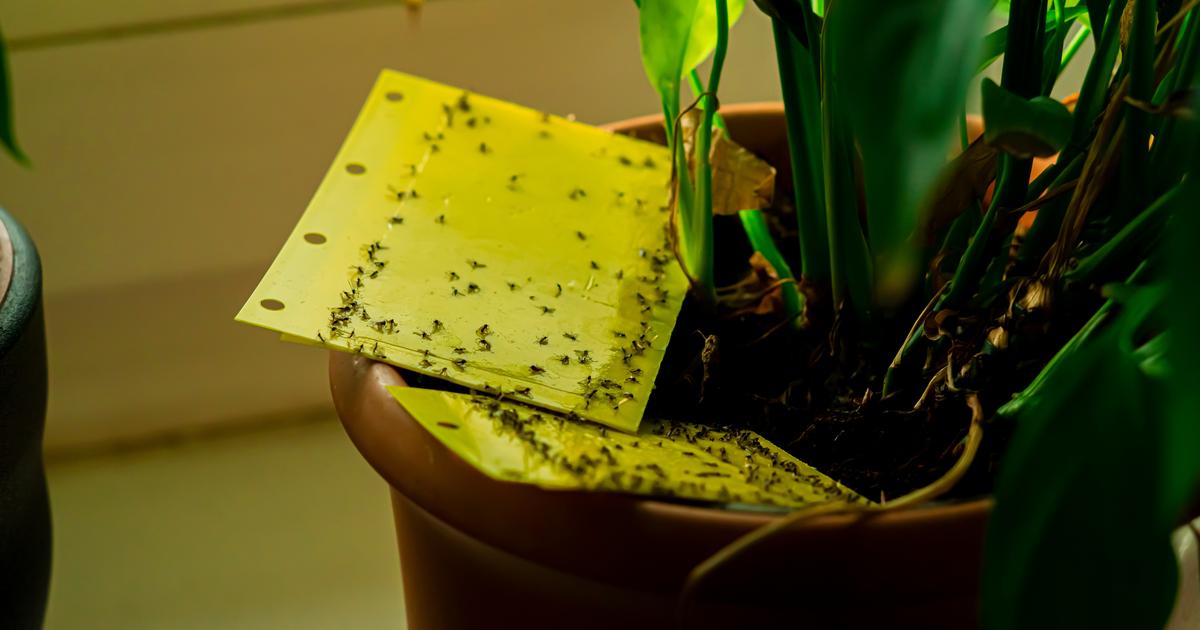Gnats
are
flying around your indoor plants and your house is starting to get infested with them?
Do not panic, it is relatively simple to get rid of it.
Gnat or fungus gnat?
Despite its nickname
"mushroom fly",
the midge is not a small fly.
It is a tiny flying insect (1 to 2 millimeters) that belongs to the Sciaridae family.
And although resembling mosquitoes, the midge does not bite.
Recognizable by their black color, midges can quickly become a real nuisance for your plants and your interior.
Indeed, their short lifespan forces them to mate and lay their eggs very quickly.
This explains their proliferation.
So it is important to fix this problem because you may get invaded in a short time if you don't take action.
Good to know
Note that midges are harmless to humans.
Why are there midges in my green plants?
As explained earlier, midges need to mate quickly.
Attracted by heat, they generally choose decomposing organic matter, such as rotting fruits or vegetables, compost, potting soil and water sources as a place to lay their eggs.
It is therefore normal to find some in your plants.
The organic matter in compost and potting soil feeds the white maggots that hatch from the eggs.
After a few weeks, the larvae will turn into adult midges which will reproduce in the same way... This cycle can last as long as the temperatures are favourable.
Although midges are harmless to humans, they can quickly become real pests for your plants.
Indeed, the larvae can attack the roots and dig galleries in the bulbs or stems.
And they can possibly carry disease to plants.
Read also5 natural ways to eliminate gnats at home
How to get rid of gnats naturally?
To stop having midges, it is important to eliminate the larvae that proliferate in the damp soil of your pots, but also the adult midges.
Tip 1
First, stop watering your houseplants.
In fact, midges love humidity.
Let them dry completely.
The larvae will dry out and die.
And if they are exposed to drought, the adults will no longer come to lay eggs.
Tip 2
To kill the larvae, you can also move your plants around the garden or put them outside for a few days.
If it is cold enough outside, this will have the effect of killing the flying insects that have taken refuge in the substrate of the plants, as well as the larvae.
Tip 3
Protect the surface of your pots to slow egg laying.
This simple but unattractive solution consists in preventing the adults from laying their eggs in the ground.
For this, you can use clay balls, gravel or sand for example.
Tip 4
To destroy these insects, spray your plants with natural repellents:
Soapy solution
: in a spray bottle, mix 30 g of liquid black soap and 1 liter of water.
Spray this mixture on the plants and repeat each week.
Essential oil: apply lemongrass or lavender essential oil to a handkerchief or cloth and place it discreetly on the pots of your houseplants.
Read alsoWhat essential oils are useful at home?
Tip 5
Set sticky traps.
This is the most classic and simplest solution even if it is not very aesthetic.
This method involves trapping adult midges with sticky traps.
You can also make your own with double-sided tape, for example, and install them in your plants.
Tip 6
Finally, to permanently get rid of the larvae that swarm in your pots: repot your plants.
Start by rinsing the roots with water and placing them back in a bleach-cleaned and well-rinsed pot, and top with new potting soil.
Preventive actions to limit the presence of midges | |
watering | Limit excess water |
potting soil | Avoid using dried blood fertilizers |
Organic waste | Avoid putting your plants near a garbage can, damaged fruit or any other rotting plant |

